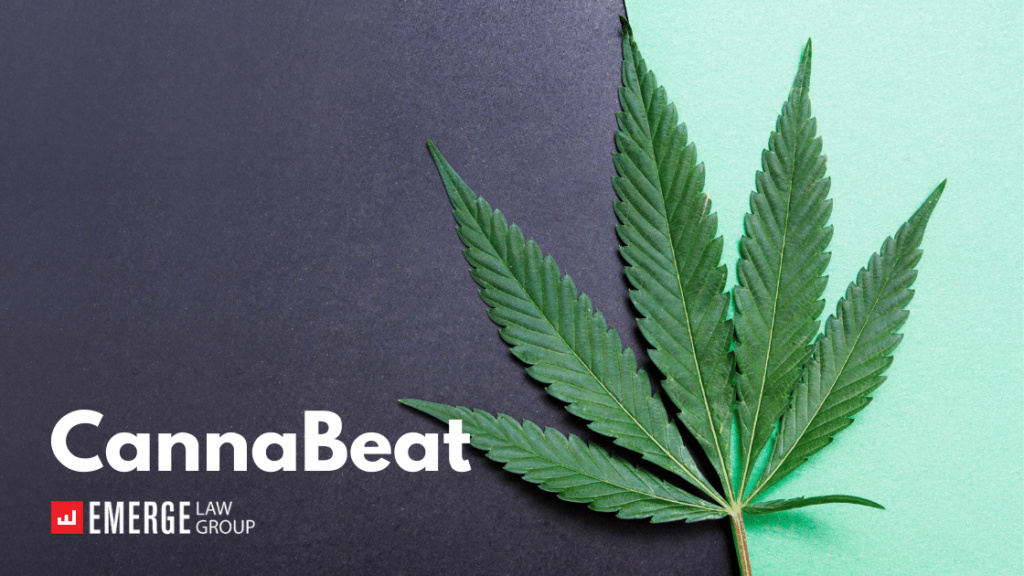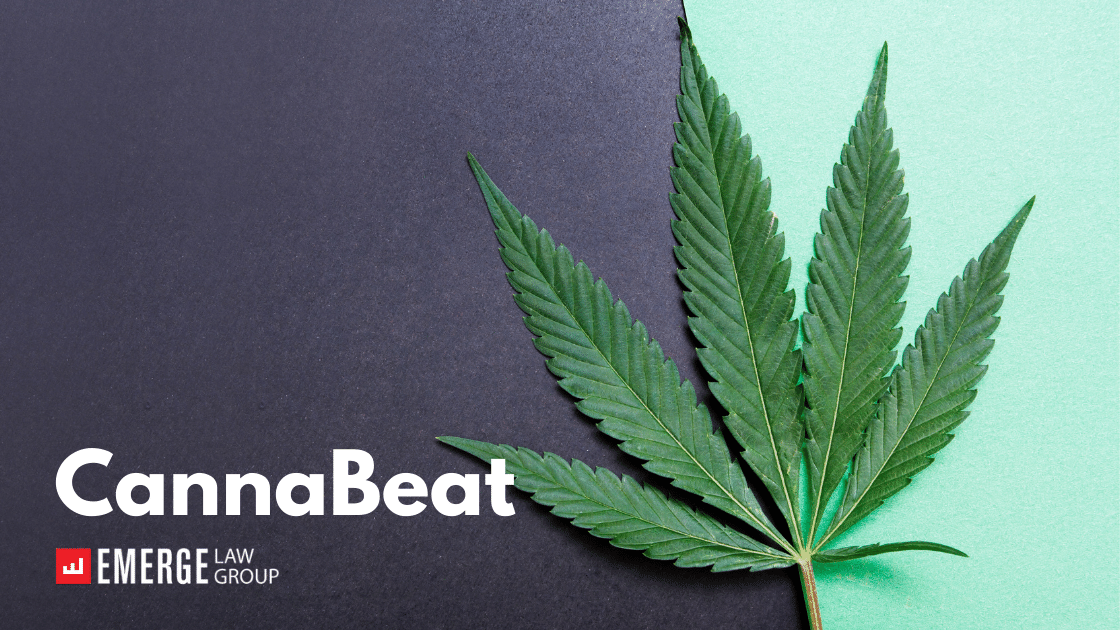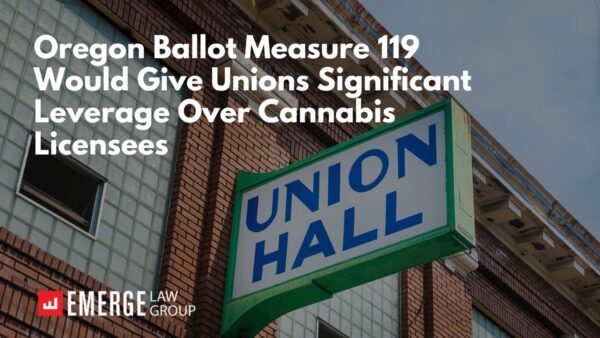CannaBeat is a curated biweekly selection of top news stories impacting business, research, and culture in the cannabis industry, crafted by Emerge Law Group.
Emerge’s Hot Take
The Complex Legal Landscape of the Cannabis Industry: Lessons from the Cookies Lawsuit
A $38 million lawsuit alleging kickbacks and sabotage at popular cannabis brand Cookies has been abruptly dropped by one of the litigants. In the original lawsuit, Paul Rock, CEO of Cookies Retail Products (CRP), claimed that Cookies executives had taken kickbacks from arrangements with third-party vendors and meddled in purchase orders, leading to significant delays and unsold cannabis products. However, in a recent statement, Rock said that he “voluntarily dismissed all suits” and that the original suit was brought only on the urging of an unidentified third party. He blamed the media for covering the issue and called the mischaracterization of the legal action “shameful and opportunistic.”
Rock’s lawsuit did not name Cookies’ co-founder and CEO, Gilbert Milam Jr., better known as Berner, who commands a significant social media presence and is one of the industry’s most powerful influencers. However, a separate litigation filed against Berner, Cookies President Parker Berling, and other executives by two current investors in the company, who claim to own about 10% of the business, is still pending.
Rich Howell, one of the attorneys at Rutan who filed the second suit on behalf of the investors, called Rock’s backpedaling a “complete reversal” but said that his clients’ legal action would continue. He noted that Rock’s claims were “verified and sworn to under penalty of perjury” and that the reversal had no bearing on their clients’ legal claims involving Cookies and its principals.
The abrupt dropping of the lawsuit is an unusual turn of events in the ongoing legal controversy surrounding Cookies. The case highlights the complex legal and business landscape of the cannabis industry, where disputes and legal actions can arise frequently due to the sector’s lack of federal regulation and compliance standards. It also underscores the need for due diligence and transparency in business dealings, especially in an industry that is still in its early stages of development and grappling with a host of challenges and uncertainties.
Other Noteworthy News
Federal: Transportation Department Finalizes Rule Authorizing Oral Fluid Drug Testing
"Officials with the US Department of Transportation have finalized a new rule authorizing commercially licensed drivers the option to undergo oral fluid testing as an alternative to urinalysis.
“This additional methodology for drug testing will give employers a choice that will help combat employee cheating on urine drug tests and provide a less intrusive means of achieving the safety goals of the program,” the agency stated in an announcement in the Federal Register. The forthcoming rule will set a 4 ng/ml cutoff limit for the presence of THC in saliva. The effective date of the new rule is June 1, 2023. However, use of oral fluid testing cannot begin until the US Department of Health and Human Services certifies at least two laboratories to perform saliva screening. To date, no labs have received HHS certification."
New Jersey Governor Signs Bill Allowing Marijuana Businesses State Tax Deductions
"New Jersey Governor Phil Murphy has signed into law a bill that allows licensed cannabis businesses to deduct certain expenses on their state tax returns. The move follows the federal IRS's 280E code, which restricts companies that sell Schedule I or II drugs from accessing key tax deductions in their federal filings. Under New Jersey's new legislation, licensed cannabis companies can at least see some state-level relief from the financial constraints caused by the implementation of 280E. The decoupling from federal 280E policy is expected to have mixed economic impacts, with a likely annual loss of revenue for the state, but it may help generate more economic activity for cannabis businesses, which could indirectly result in an indeterminate amount of additional annual revenue for the state and local governments that tax cannabis businesses. Other states, including Iowa, New York, Pennsylvania, and Virginia, are similarly pursuing tax relief for their marijuana markets. At the congressional level, lawmakers have been working to pass legislation, including the Secure and Fair Enforcement (SAFE) Banking Act, which would treat the cannabis sector like other legitimate enterprises."
After Two Decades, Maryland Moves from Recognizing Medicinal Cannabis to Recreational Use
"The signing of legislation legalizing cannabis in Maryland marks a mile post in a long, strange trip for one Republican former delegate turned marijuana policy advocate. Don Murphy, a former lawmaker from Baltimore County, once sponsored legislation two decades ago that made it possible for someone arrested for possession of the drug to argue it was for medicinal purposes. “It was Maryland’s first acknowledgement that marijuana had medicinal value,” said Murphy, reflecting on the 2003 law signed by then Gov. Robert L. Ehrlich (R) the year after Murphy left the legislature. “Here we are 20 years later going, ‘It doesn’t matter, have a nice day, have fun. And we’re going to stop arresting people,’ and all that. In perspective, it’s a shame as we think of all the people whose lives have been ruined in the meantime. But better late than never.” At the time, the Republican wasn’t on board with full blown legalization."
Teen Marijuana Use Has Been Declining Since Legal Dispensaries Started Opening, Federal CDC Study Shows
"According to the Centers for Disease Control and Prevention’s Youth Risk Behavior Survey (YRBS), teen use of cannabis has been decreasing since legal dispensaries began opening. In 2021, the percentage of high school students reporting marijuana use in the past 30 days dropped to 15.8 percent, down from 21.7 percent in 2009, and significantly lower than the record high of 23.4 percent in 2013. Even lifetime marijuana consumption among teens has decreased by nearly 10 percentage points since 2019. Studies and surveys, including those conducted or funded by the federal government, have repeatedly shown that legalizing cannabis for adults does not increase teen usage. While COVID likely contributed to the decline in cannabis and other substance use in 2021, the trend has been consistent over the course of the reform movement. The latest CDC study is encouraging news for public health officials, but substance use remains common among U.S. high school students, and continued monitoring is important in the context of the changing marketplaces for alcohol beverage products and other drugs. Therefore, scaling up tailored, evidence-based policies, programs, and practices to reduce factors that contribute to the risk for adolescent substance use and promote factors that protect against risk might help build on recent declines."
NBA Allows Passive Investment and Ends THC Testing, But No Marijuana Brand Promotion for Players
"The National Basketball Association (NBA) has clarified that its players will not be allowed to promote marijuana brands under the new collective bargaining agreement, despite previous reports suggesting otherwise. However, the league will allow passive investments in the marijuana industry and remove the testing requirements for THC. Players can invest in CBD companies without restrictions and hold a passive, non-controlling interest in companies that make marijuana products. The policy change also formally codifies the league's decision to temporarily suspend cannabis testing for the past three seasons. While players are free to consume cannabis legally off the court, they remain barred from using it during games or other team-related events. The move comes as more states legalize cannabis, leading to reforms in other professional sports leagues such as Major League Baseball and the UFC."
Subscribe
Subscribe to CannaBeat to receive essential weekly articles on news, business, and culture in the cannabis industry, delivered straight to your inbox.
CannaBeat by Emerge Law Group
CannaBeat is a weekly brief on news, business, and culture in the cannabis industry curated by members of Emerge Law Group's distinguished Cannabis Industry Group.






